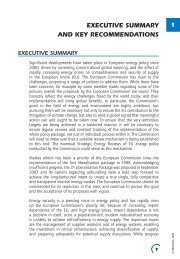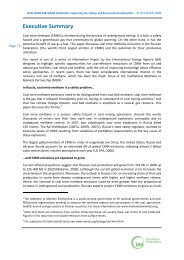Facing China's Coal Future - IEA
Facing China's Coal Future - IEA
Facing China's Coal Future - IEA
You also want an ePaper? Increase the reach of your titles
YUMPU automatically turns print PDFs into web optimized ePapers that Google loves.
<strong>Facing</strong> China’s <strong>Coal</strong> <strong>Future</strong>: Prospects and Challenges for CCS © OECD/<strong>IEA</strong> 2011<br />
Stakeholder Perceptions of CCS Options in China<br />
Introduction and views on role of CCS<br />
Page | 44<br />
In co‐ordination with the <strong>IEA</strong>, the China <strong>Coal</strong> Information Institute (CCII) 5 and The Climate Group<br />
China, jointly conducted a survey to identify stakeholder perceptions of aspects of CCS<br />
technology development in China. The 49 stakeholders surveyed included representatives from<br />
government (8), industry (12), research institutions (25), and international organizations (4), with<br />
expertise in CCS‐related energy policy, technical programmes and industries. This section<br />
discusses the survey results and provides an indication of stakeholder perspectives on a range of<br />
CCS technology development trends in China. The responses reflect personal opinions of<br />
respondents and do not represent the positions of the agencies involved. They should be viewed<br />
as providing insight and background to the current debate and discussion of CCS activities and<br />
their direction in China.<br />
Role of CCS in China<br />
The survey suggests that approximately 80% of stakeholders consulted consider CCS a necessary<br />
technology to deal with climate change, though the role, scale and the sectors most impacted<br />
vary according to economic drivers, pace of technical development and the learning curve. The<br />
findings also suggest that Chinese government agencies have adopted a positive but cautious<br />
view of CCS development, noting that critical economic and technical issues remain to be<br />
resolved. 75% percent of government stakeholders responded that CCS may be an important<br />
means to reduce China’s GHG emissions in the future, with industry stakeholders taking a<br />
somewhat lower though still positive attitude.<br />
Among the mitigation options currently available, many stakeholders suggest that priority should<br />
be given to:<br />
<br />
<br />
<br />
<br />
(1) developing energy efficiency measures,<br />
(2) renewable energy deployment,<br />
(3)nuclear energy technologies, and<br />
(4) CCS, as it is identified as the lowest priority of the four options.<br />
Respondents from key research institutes and government agencies expressed that the energy<br />
penalty and co‐ordination required across multiple industry sectors for large‐scale deployment of<br />
CCS are barriers that limit long‐term sustainability of the technology, given unclear cost<br />
requirements to make CCS a reality. There was scepticism from some stakeholders, who felt that<br />
it would be challenging to develop scalable applications in industry at reasonable cost and for<br />
large‐scale application of CCS across varying sectors and projects of varying scale. Nonetheless,<br />
increased focus on carbon capture and CO 2 utilisation in China, using recycled CO 2 in production<br />
processes, may be a choice to transition to the deployment of CCS for reduction of GHG<br />
emissions.<br />
5<br />
The China <strong>Coal</strong> Information Institute is a research institute under China’s State Administration of Work Safety.
















